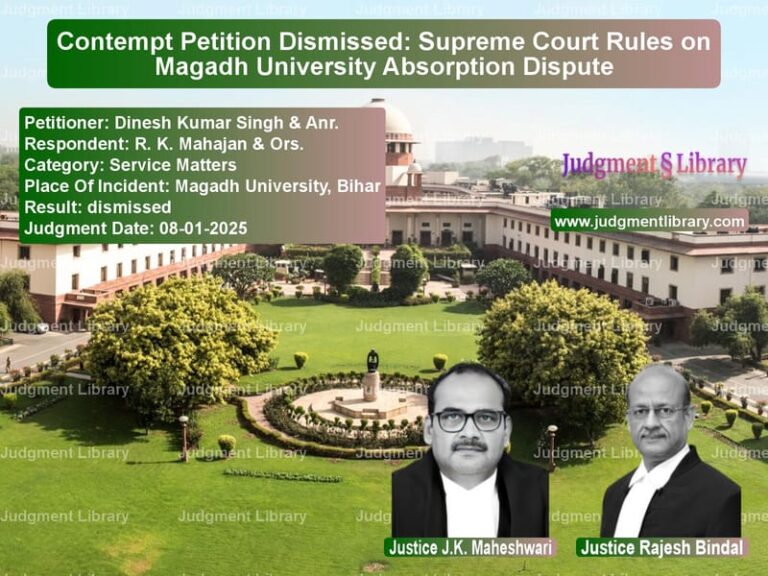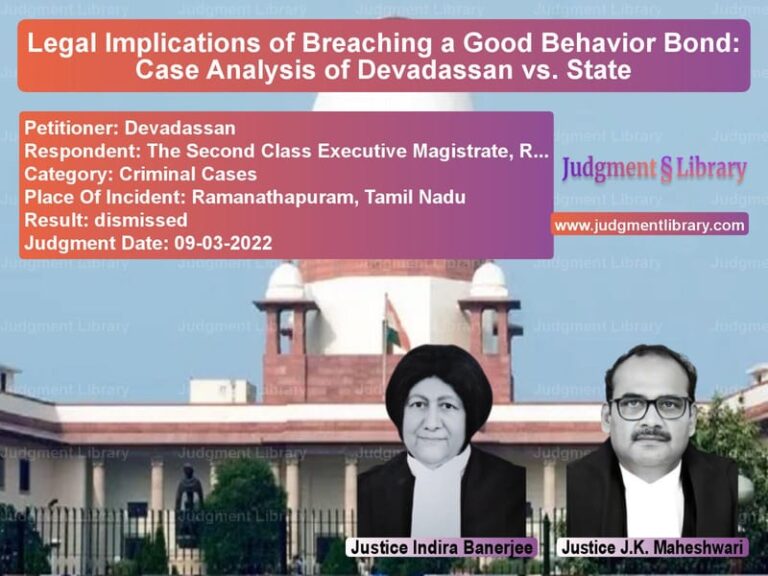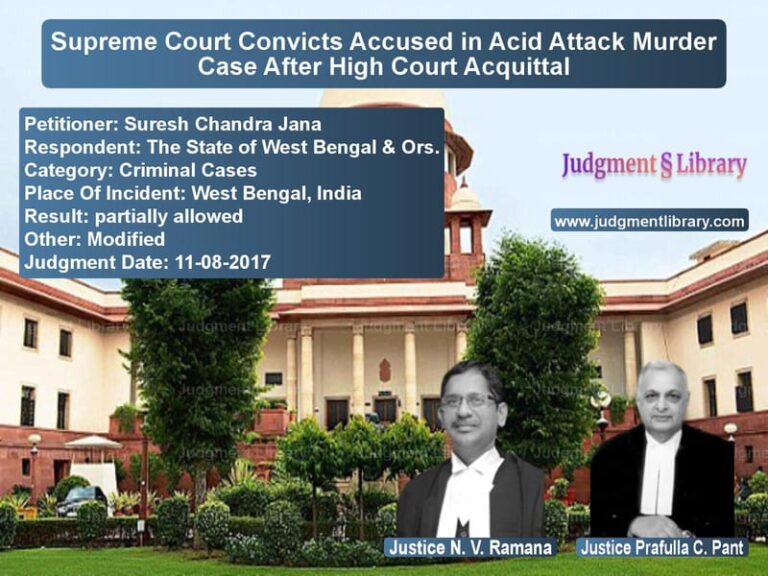Supreme Court Lays Guidelines for Speedy Trial in Cheque Bounce Cases Under Section 138 NI Act
The Supreme Court of India, in a landmark judgment in Suo Motu Writ Petition (Criminal) No. 2 of 2020, has issued extensive guidelines to ensure the expeditious trial of cases under Section 138 of the Negotiable Instruments Act, 1881 (NI Act). This decision was driven by the large number of cheque bounce cases pending before various courts, leading to significant delays in justice delivery.
Background of the Case
The issue of delayed disposal of cases under Section 138 NI Act has been a longstanding concern in India’s legal system. These cases, which pertain to the dishonor of cheques due to insufficient funds, are quasi-criminal in nature and involve both civil and criminal liabilities.
The Supreme Court took suo motu cognizance of this issue when it observed that an appeal related to cheque bounce cases had been pending for 16 years. The Court noted that over 35.16 lakh cheque bounce cases were pending across various courts, significantly affecting the disposal rate of other criminal cases.
Key Issues Raised
- What are the reasons for the delay in the disposal of Section 138 NI Act cases?
- What systemic reforms can be implemented to expedite the resolution of cheque bounce disputes?
- Can mediation and alternative dispute resolution (ADR) mechanisms be effectively used in such cases?
- Should there be amendments to existing legal provisions to streamline procedures?
Arguments by the Amicus Curiae and Other Stakeholders
The Supreme Court appointed senior advocate Sidharth Luthra as the Amicus Curiae to assist in analyzing the delays in cheque bounce cases. Based on his report and responses from multiple stakeholders, including the Reserve Bank of India (RBI) and state governments, the following key arguments were made:
Read also: https://judgmentlibrary.com/mukhtar-ansaris-custody-supreme-court-orders-transfer-to-uttar-pradesh/
- “Summons service is a major cause of delay in cheque bounce cases, often taking months or even years.”
- “The limitation imposed by Section 219 of the Criminal Procedure Code (CrPC), which restricts the trial of multiple offenses to three in one proceeding, needs to be relaxed for cheque bounce cases.”
- “Alternative dispute resolution mechanisms such as mediation should be encouraged to resolve disputes without burdening courts.”
- “There is a need to amend the NI Act to allow attachment of the accused’s bank account for securing payment before trial.”
Supreme Court’s Observations and Guidelines
The Supreme Court analyzed various issues affecting the expeditious disposal of cheque bounce cases and issued the following guidelines:
1. Efficient Service of Summons
- “To expedite service of summons, electronic means such as emails, SMS, and WhatsApp can be used.”
- “Dishonor slips issued by banks must include the drawer’s latest contact details, including email and phone number.”
- “Courts should treat service of summons in one complaint as deemed service for all complaints related to dishonored cheques issued as part of a single transaction.”
2. Amendment to Section 219 of CrPC
- “Currently, Section 219 of CrPC limits the number of offenses that can be tried together to three if committed within a year. We recommend legislative amendments to allow the trial of multiple cheque bounce cases in one proceeding.”
3. Encouragement of Mediation
- “Courts should actively refer cheque bounce cases to pre-summons mediation to encourage settlements and reduce trial workload.”
- “High Courts are directed to frame practice directions making mediation the preferred mode of resolution in cheque bounce cases.”
4. Attaching Bank Accounts to Secure Payment
- “We recommend legislative amendments allowing trial courts to attach the accused’s bank account for securing payment of the cheque amount before trial.”
- “This measure will deter frivolous defenses and encourage settlements.”
5. Clarification on Conversion of Summary Trials
- “Many magistrates unnecessarily convert summary trials into summons trials, leading to delays. We direct High Courts to issue practice directions ensuring summary trials are the default mode for Section 138 cases.”
6. Judicial Review and Discharge Applications
- “Trial courts cannot recall summons once issued, except in cases where jurisdictional errors are evident.”
- “The law should be amended to allow magistrates to recall summons in exceptional circumstances, preventing unnecessary trials.”
Supreme Court’s Judgment
The Supreme Court, in its judgment, issued the following orders:
- High Courts must issue practice directions to ensure speedy disposal of cheque bounce cases.
- Trial courts must follow electronic methods for summons service.
- Legislative amendments to allow multiple cases to be tried together should be considered by the government.
- Encouragement of mediation as the preferred dispute resolution method.
- Consideration of pre-trial attachment of the accused’s bank accounts.
Key Takeaways from the Judgment
- Technology-driven solutions: The Court’s directive to use electronic summons will reduce trial delays.
- Pro-business approach: Speedy disposal of cheque bounce cases will enhance commercial confidence.
- Judicial efficiency: High Courts and magistrates are directed to take steps to ensure trials are concluded quickly.
- Potential legislative changes: Amendments to the NI Act and CrPC will bring greater clarity and efficiency.
Conclusion
The Supreme Court’s judgment in the suo motu case on cheque bounce matters is a landmark decision aimed at improving the efficiency of India’s judicial system. By issuing concrete guidelines and proposing legislative changes, the Court has provided a roadmap for reducing the backlog of Section 138 NI Act cases. This judgment is expected to streamline cheque bounce litigation, benefiting both complainants and the accused while reinforcing trust in commercial transactions.
Petitioner Name: Suo Motu Writ Petition (Criminal) No. 2 of 2020.Respondent Name: Union of India & Others.Judgment By: Justice S.A. Bobde, Justice L. Nageswara Rao, Justice B.R. Gavai, Justice A.S. Bopanna, Justice S. Ravindra Bhat.Place Of Incident: India.Judgment Date: 16-04-2021.
Don’t miss out on the full details! Download the complete judgment in PDF format below and gain valuable insights instantly!
Download Judgment: suo-motu-writ-petiti-vs-union-of-india-&-oth-supreme-court-of-india-judgment-dated-16-04-2021.pdf
Directly Download Judgment: Directly download this Judgment
See all petitions in Fraud and Forgery
See all petitions in Cheque Dishonour Cases
See all petitions in Judgment by S. A. Bobde
See all petitions in Judgment by L. Nageswara Rao
See all petitions in Judgment by B R Gavai
See all petitions in Judgment by A. S. Bopanna
See all petitions in Judgment by S Ravindra Bhat
See all petitions in allowed
See all petitions in supreme court of India judgments April 2021
See all petitions in 2021 judgments
See all posts in Criminal Cases Category
See all allowed petitions in Criminal Cases Category
See all Dismissed petitions in Criminal Cases Category
See all partially allowed petitions in Criminal Cases Category







